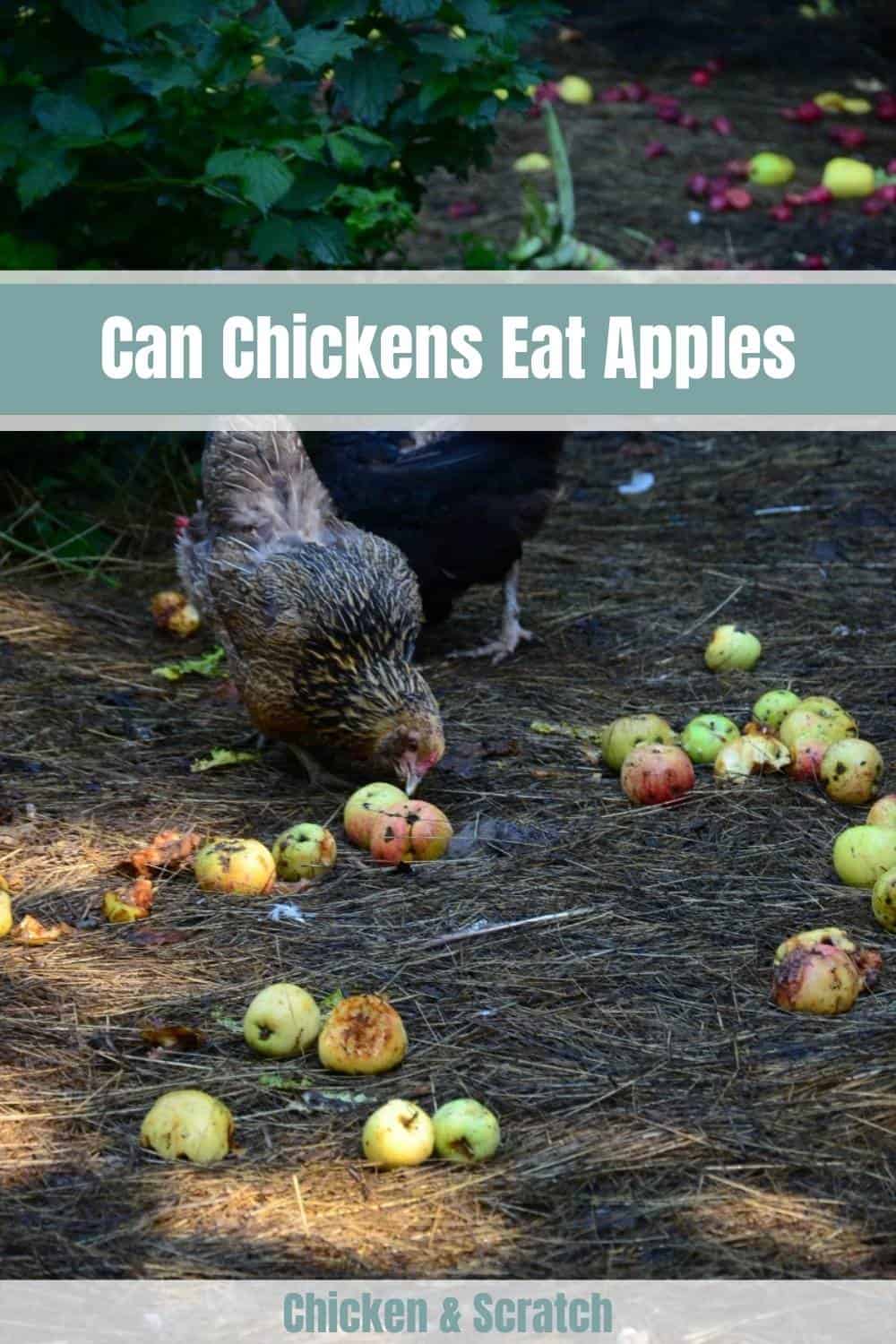Apples are one of chickens’ favorites because of their tastiness. They contain different nutrients such as magnesium, vitamins, iron, etc., which help your chickens remain healthy. Since feeding your chickens with healthy foods is essential, you want to add apples to your chickens’ diet. Read below what parts of apples you should give your chickens and how often.
This article will cover
- 4 Things To Know About Chickens Eating Apples
- 7 Reasons You Should Give Your Chickens Apples
- 5 Ways To Choose The Right Apples For Your Chickens
- 5 Other Foods You Shouldn’t Give Your Chickens
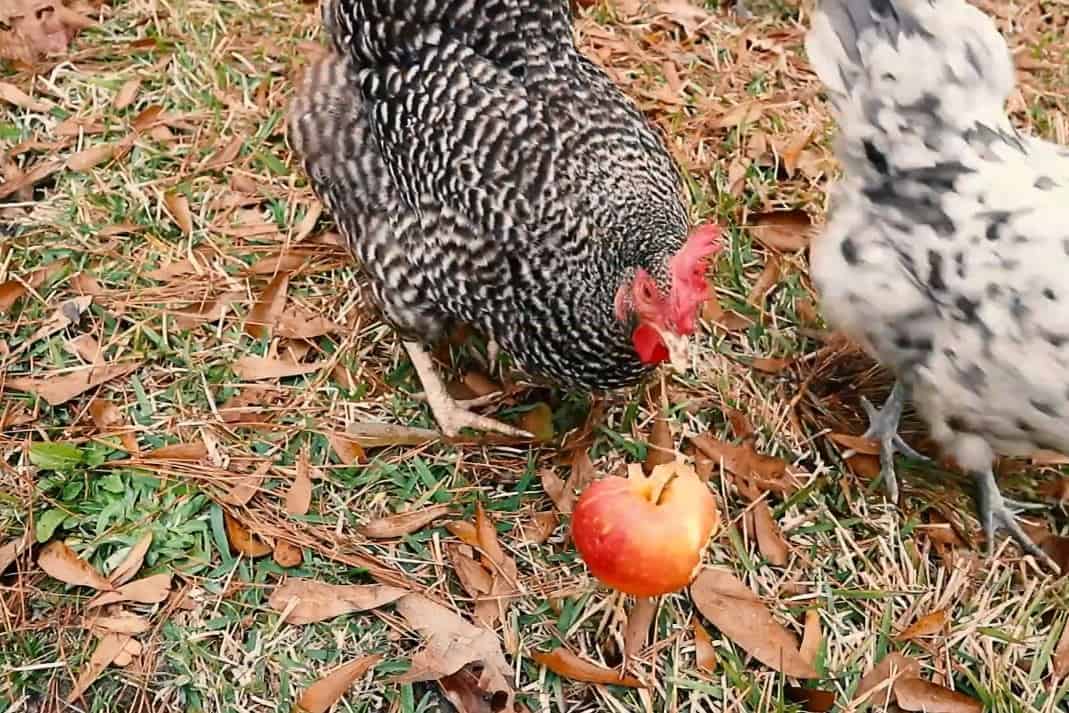
4 Things To Know About Chickens Eating Apples
One thing you should take note of is that not all chicken breeds love to eat apples. This is why chickens have their feed since they can’t digest all human foods. You can test your chickens with some apple slices to know if they like it or not. If they do, you can make it a regular treat. Below are some things to know if your chickens love to eat apples.
Can Chickens Eat Apple Peels?
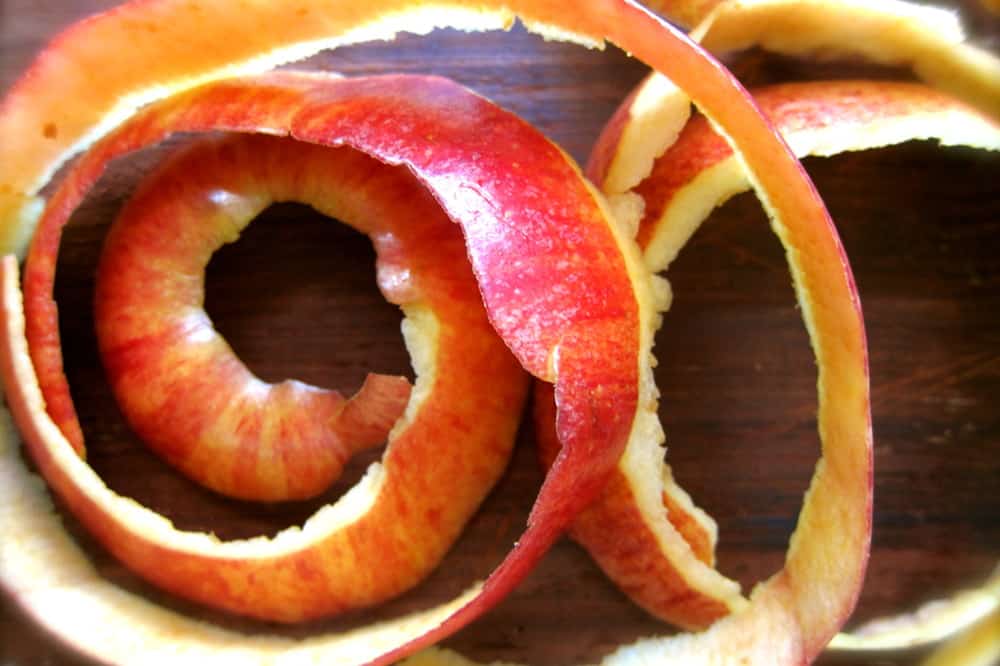
Not every chicken likes apple peels. However, apple peels are safe for your chickens to eat. They are rich in fiber and antioxidants, which keep your birds satiated and boost their immune system. Watch how your chickens react when you give them apple peels. If they don’t like the peels, then don’t give them.
Can Chickens Eat Apple Seeds?
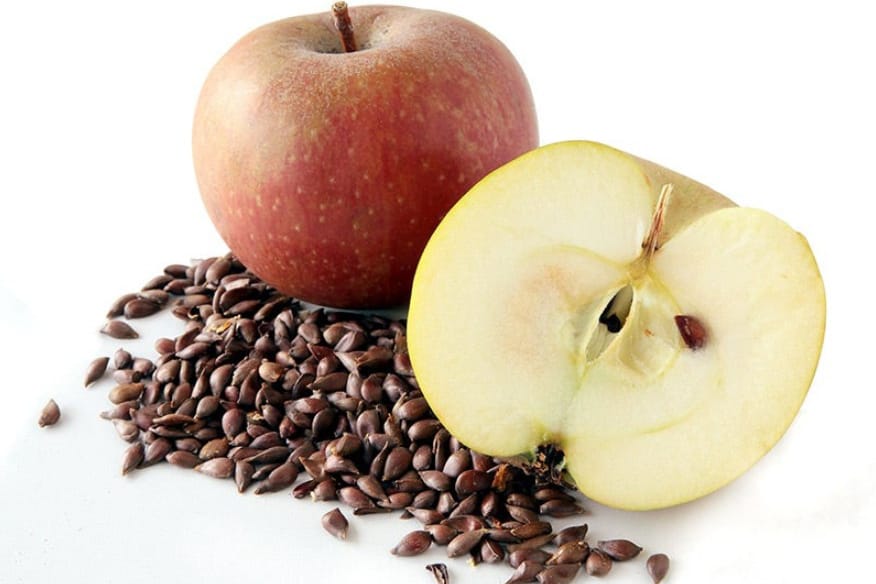
Apple seeds aren’t safe for your chickens to eat. They contain cyanide which disrupts the metabolic process. When ingested, it cuts off the oxygen supply to the cells. This is known as cyanide poisoning.
If your chickens eat apple seeds, they will likely have health complications. Chickens don’t need to eat many seeds before they get sick. Once you notice that your chickens find it hard to breathe or their comb changes color, they likely suffer from cyanide poisoning. Get them adequate veterinary care as soon as possible, as chickens die within 30 to 50 minutes of cyanide poisoning.
Can Chickens Eat Apple Cores?
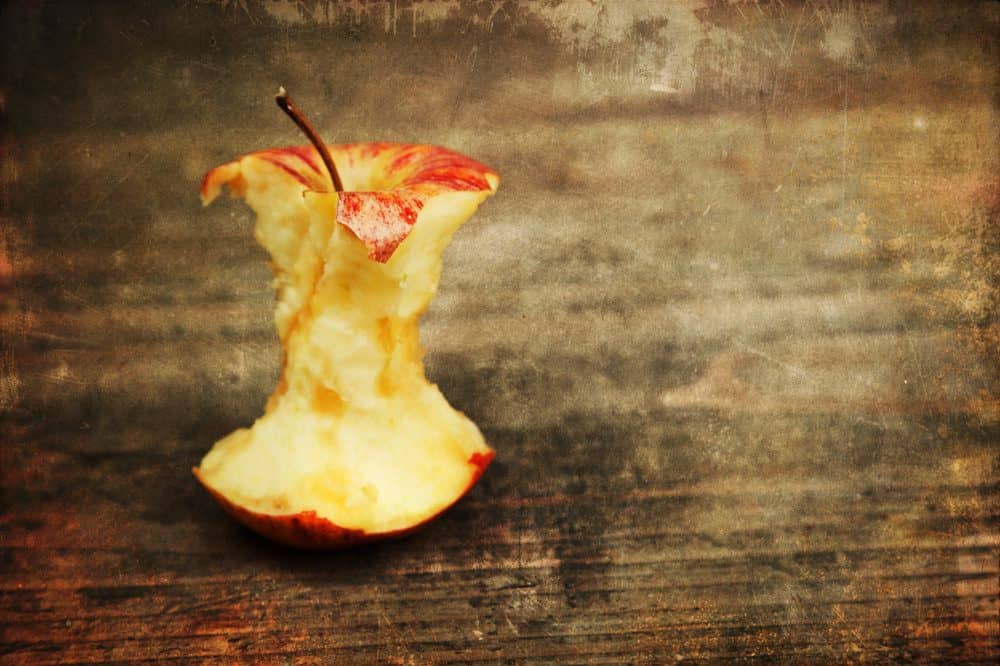
Even though apple cores are nutritious, they are hard, making it difficult for your chickens to eat them. However, if your chickens enjoy apple cores, ensure you take out the seeds entirely before you serve your chickens. Also, dice them properly to prevent your chickens from choking on them. Otherwise, you can ignore giving your chickens apple cores to avoid any health complications.
Can Chickens Eat Apple Flesh?
The apple flesh is the part of the apple beneath the skin. It is the apple’s sweetest, softest, and most edible part. Your chickens will enjoy feasting on this part. Ensure you cut it into small sizes before you serve it to your chickens.
7 Reasons You Should Give Your Chickens Apples
Apples aren’t only tasty; they are loaded with lots of nutrients. However, the nutritional value varies from one variety to the other. Below are some of the reasons you should give your chickens apples.
100g Apple Nutrition
| Nutrient | Value |
| energy | 52 kcal |
| water | 85.6 g |
| protein | 0.26 g |
| fat | 0.17 g |
| carbohydrate | 13.8 g |
| fiber | 2.4 g |
| sugars | 10.4 g |
| Vitamin C | 4.6 mg |
| Vitamin K | 2.2 ug |
| Manganese | 0.035 mg |
| iron | 0.12 mg |
| potassium | 107 mg |
| magnesium | 5 mg |
| phosphorus | 11 mg |
| sodium | 1 mg |
| zinc | 0.04 mg |
| folate | 3 mcg |
Digestion
Apples have high fiber content, both soluble and insoluble, which eases digestion and satiates your chickens. Fiber also helps with regulating blood sugar. You won’t have to feed your chickens round the clock if you give them apples.
Health
Apples are enriched with anti-inflammatory properties and vitamin C, which boosts animal immune systems. Vitamin C also guards against environmental stress.
Cholesterol
Research has shown that apples contain nutrients that help lower bad cholesterol in your chickens. Bad cholesterol, also known as low-density lipoprotein, damages the health of your chickens. It hurts the internal organs and leads to obesity.
Weight
It’s bad for your chickens to be obese. Obese chickens usually have health complications. This is because the extra fat in their bodies hinders body temperature regulation and makes their livers more fragile.
In extreme cases, the livers burst, and the chickens die. However, eating apples keep your chickens from becoming obese. Apple contains fiber that will keep your chickens satiated and from eating at every time; as such, regulating their weight.
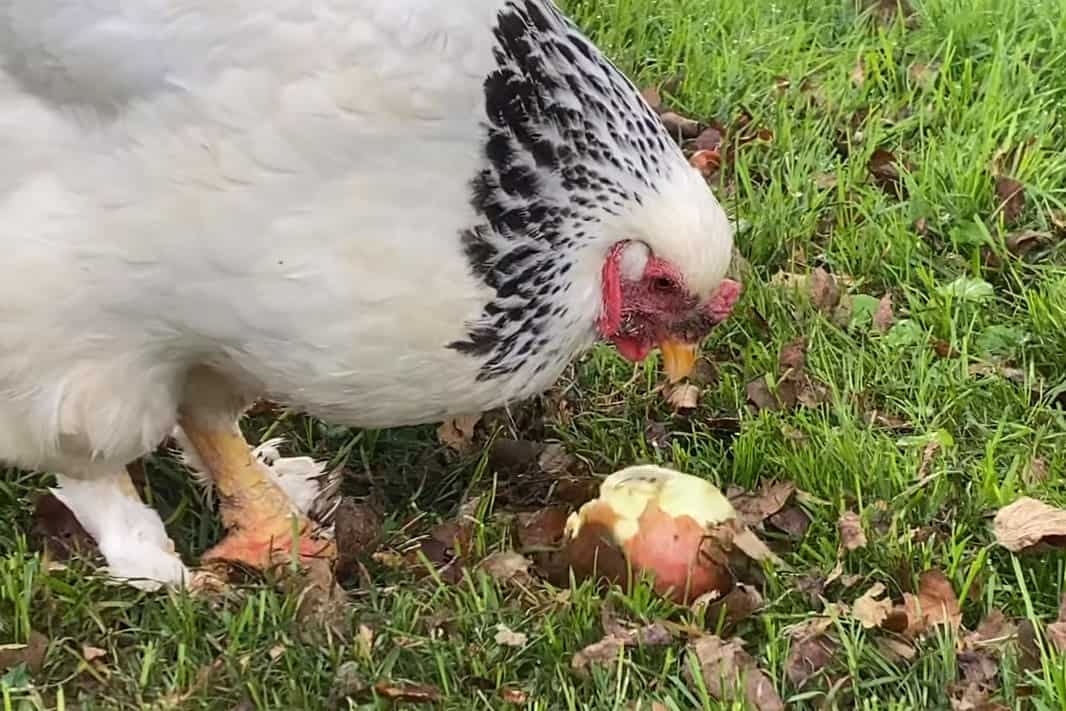
Bowel movements
You have to ensure that what you give your chickens doesn’t hinder their bowel movements. They should be able to pass out their droppings as quickly as they eat and swallow food. Therefore, apple aid digestion, prevent constipation, and aid bowel movements in your chickens.
Bone health
Your chickens need strong, healthy bones for them to survive. Their feed is intentionally made to contain nutrients that aid bone development and health. Apples contain antioxidants that fight diseases that lead to bone wasting, such as inflammation and free radicals.
Blood sugar
Like humans, chickens can also have problems with their blood sugar. They can also have diabetes, although it isn’t common. Even though your chickens need a high blood sugar level to aid their metabolic activities, their blood sugar needs to be regulated. Apples help with regulating the production of insulin and glucagon in your chickens.
5 Ways To Choose The Right Apples For Your Chickens
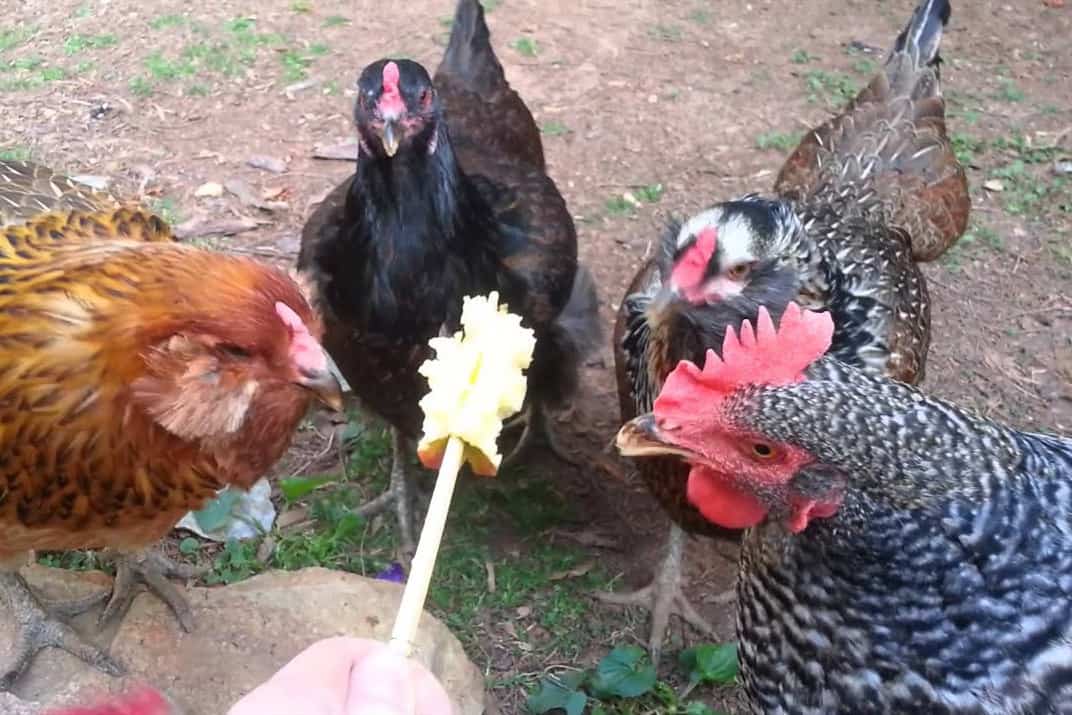
Picking good apples isn’t a difficult task. Right from the texture and density of an apple, you can tell if an apple is safe for eating or not. Here are some of the things you should consider when choosing the right apples for your chickens.
Varieties
There are lots of varieties in the market. As such, what you look out for in each variety can be quite different. For instance, some varieties are Gala, Fuji, Pink Lady, Honeycrisp, etc. Some varieties are hard, while some are soft.
What you choose depends on your purpose in buying the apples. Since you’re buying apples to feed your chicken, you should buy the hard varieties instead because they are crunchy. Softer varieties can’t stay firm for long. To be sure of the characteristics each type should have, ask a local farmer or orchard employee.
Texture
Another thing to consider when picking good apples is the texture. It shouldn’t be mushy or moldy. The apple should be firm to touch and not give. However, test the texture with your palm, not your fingers, to avoid bruising the apple. Also, if you notice any growth on the apple, it has expired and shouldn’t be consumed.
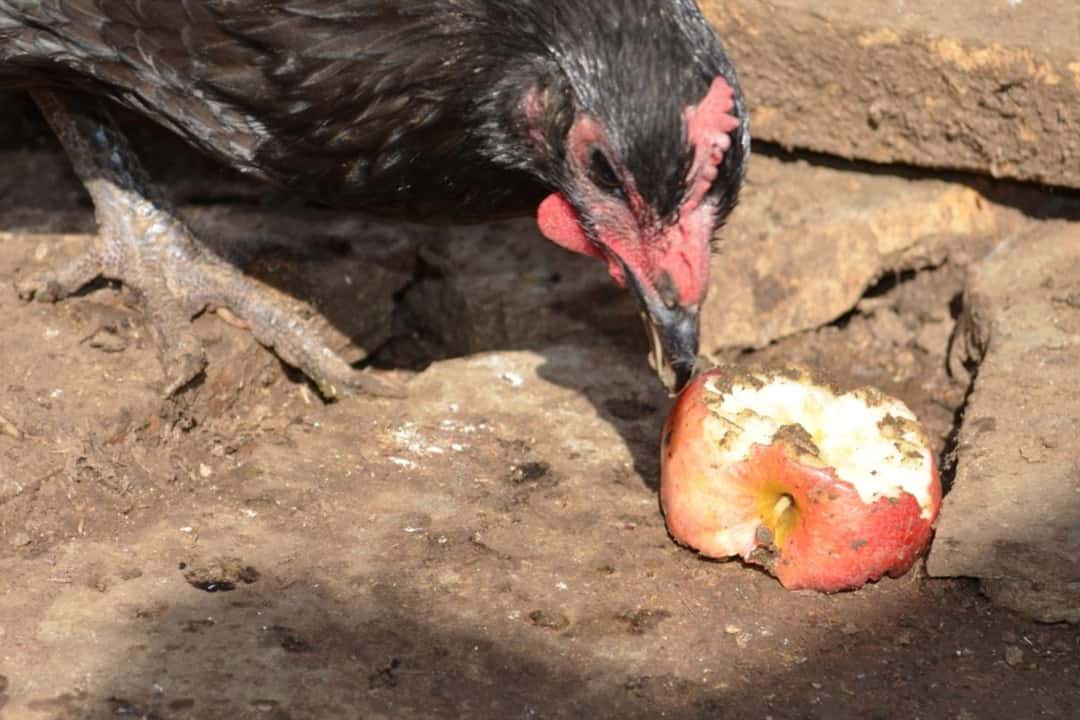
Color
Apples come in different colors, so color isn’t a strong determinant of good apples. They can be red or green, depending on the apple variety. However, a good apple has a vibrant color and no discoloration. Discoloration indicates that the apple has expired.
Appearance
Good apples have taut skin. They aren’t wrinkled or overcome with bruises and soft spots. Also, they don’t have holes or any other blemish. Apples with blemishes all over aren’t safe for consumption.
Taste
Before you feed any apple to your chickens, have a taste. If it’s crisp and juicy, the apple is safe for consumption. If it has a sour or grainy taste, the chances are that the apple has gone bad. You’d risk your chickens’ health if you gave them bad apples.
Expiry date
If you’re buying apples at the store, the crate usually has an expiry date. Check the expiry date before you buy the apples. Only buy the quantity your chickens can consume before the expiry date.
How Many Apple Can Chickens Have?
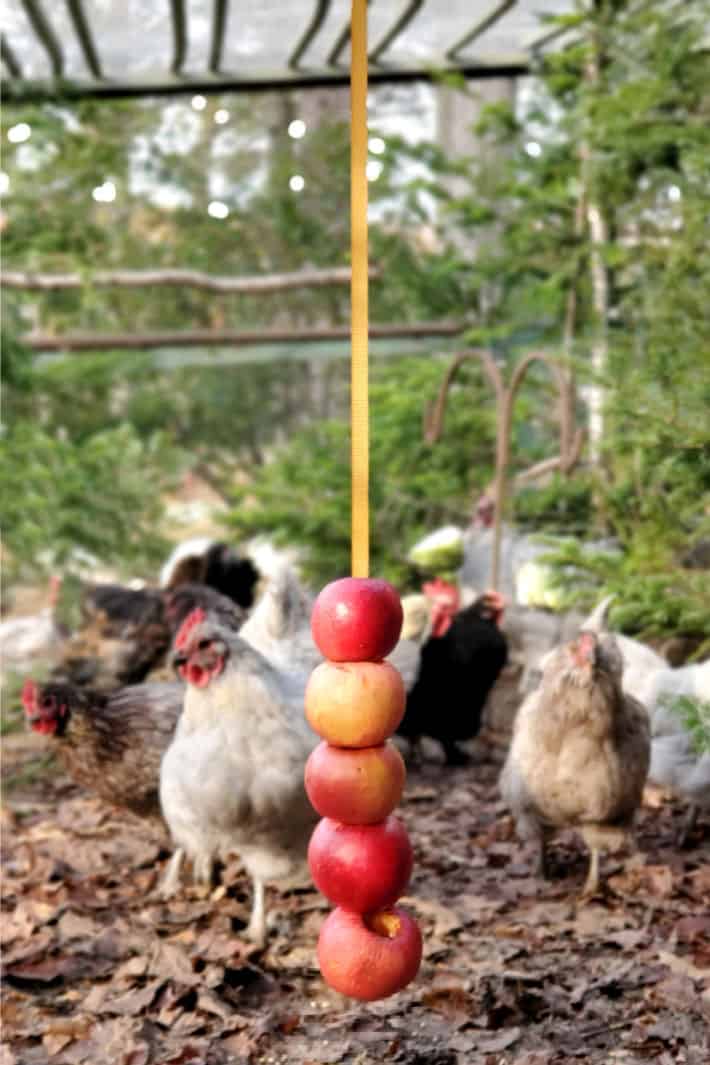
To maintain optimal nutritional balance within their diet plans, adding bits and pieces (roughly grape or blueberry sized), about 1-2 servings max serving per week is adequate. Apples are rich sources of fiber that promote healthy digestion. But, excessive intake often leads to gastrointestinal problems (using unripe or rotten fruits).
Note that safety precautions while handling and feeding apples are important. For example, cutting it into reasonably small sizes and removing the core and seed will help greatly!
Feeding chickens apples can be a suitable dietary supplement; however, it’s crucial to feed them in moderation as a treat instead of making them the mainstay source. Apples hold high fiber content and sugar levels that come with underlying problems specifically related to chicken digestive tracts leading to bloat and stomach ache if taken excessively.
5 Other Foods You Shouldn’t Give Your Chickens
Not every food, either vegetables, fruit, or meals, is good for your chickens. For instance, some foods have great nutritional value but can’t be easily digested by chickens, while some contain chemicals that cause several health complications. Below are some of the foods you shouldn’t give your chickens.
Raw Eggs
Even though eggs are excellent sources of proteins for chickens, you should be careful with feeding them with raw eggs. Once chickens know how tasty raw eggs are, they’ll eat them after laying them. As such, you won’t be able to collect as many eggs as you want, nor will your chickens brood over the eggs to produce chicks. If you feed your chickens eggs at all, ensure they aren’t raw.
Spoilt Foods
Chickens aren’t large animals with digestive systems that can digest anything at little or no risk. Chickens are very delicate animals with sensory organs. The fact that they are animals doesn’t mean you feed them rotten and overripe food. Don’t feed your chickens with what you can’t eat.
Dairy Products
Dairy products, such as milk, butter, etc., contain lactose which chickens can’t easily digest. Don’t include any dairy products in their feed. Instead, look for other tolerant foods to serve as calcium sources, such as mixing ground eggshells with their feed.
Uncooked Foods
Don’t give your chickens raw foods that should be cooked before anyone eats them. For instance, don’t give your chickens uncooked beans. Their digestive systems aren’t strong enough to digest raw beans. Besides, raw beans contain hemagglutinin, which is dangerous to health.
Avocado
No part of the avocado is safe for consumption by your chickens. Giving your chickens avocado exposes them to the risk of myocardial necrosis. Just a little bit of the fruit can kill your chickens within two days. Every part of an avocado contains toxins, with the leaves being the most toxic. Also, remove anything related to avocados in your environment before you allow your chickens to forage.
Summary
Most chickens love eating apples. You can tell by their excitement when you serve the diced apples to them. But not all chicken breeds love apples. If your chickens don’t like them, you can give them other fruits like apples or vegetables. If your chickens do, don’t forget to remove the seeds and cores from the apples you’re giving your chickens.
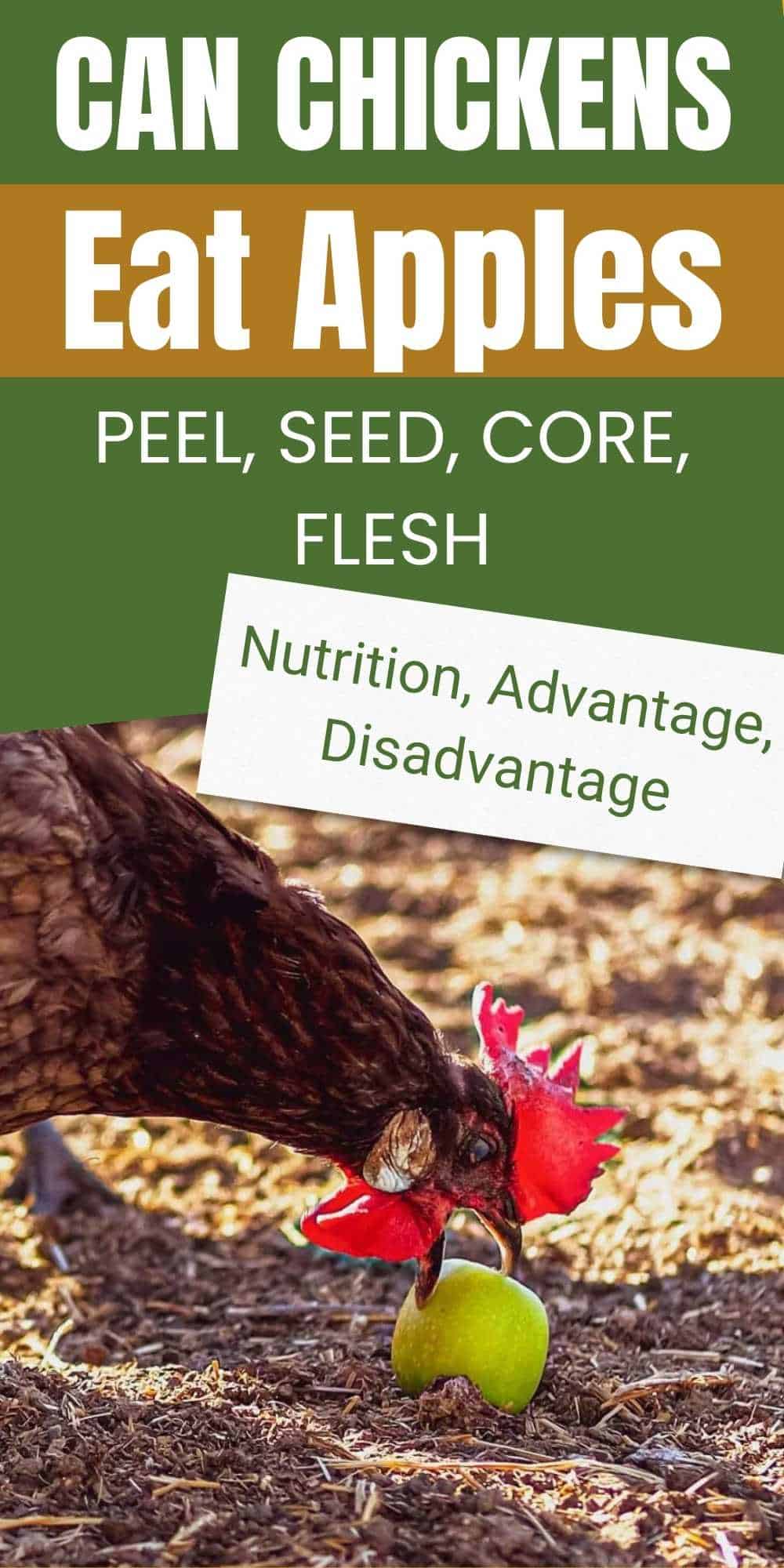

Joseph Hudson has been raising chickens for over 15 years. In 2018, he completed the Agriculture & Natural Resources program at Mt. San Antonio College. He currently raises over 1400 chickens on his 7.5-hectare farm. He keeps sharing his experience on raising healthy and happy chickens on Chicken Scratch The Foundry.
